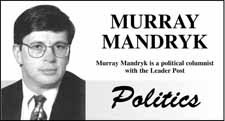A story emerging out of the Saskatchewan Association of Rural Municipalities (SARM) convention earlier this month has caused quite a stir on the political blogs and media chat sites.
The reaction said much about the rural-urban division that remains in this province.
But it also offered some insight into the complex nature of rural Saskatchewan and its relations with government.The issue seemed innocuous enough. At the annual bearpit session in which SARM delegates get to put cabinet ministers' feet to the fire, the local rural politicians raised the issue of SaskTel's inadequate high-speed Internet services provided to its rural Saskatchewan.
While some might not consider this a big deal, it most certainly is a legitimate issue to many people. Those of us who have become dependent on the Internet for work, commerce or even pleasure are all too aware of the frustrations of slow service. And the legitimate frustration for many in rural Saskatchewan - especially those living on farms - is they simply don't have an alternative for Internet service other than the publicly-owned telephone utility.
That said, it was also legitimate for the Saskatchewan Party government and Minister Bill Boyd, responsible for SaskTel, to argue that it has devoted $120 million to improving SaskTel tower service and - notwithstanding the profits government has recently stripped from this Crown corporation - it really can't afford much more.
While an interesting little debate, one might not think it would cause all that much heat. However, the feedback from the news stories suggested a lot of people felt it was bigger, more meaningful issue than one might have expected.
The story received surprising interest and the CBC TV version was broadcast nationally. And the reaction on various media feedback forums - including the CBC's website - seemed to suggest the old urban-rural divide is alive and well.
Many of the comments, questioned the appropriateness of such expenditure when city people need money for more pressing things like schools, housing and hospitals. Others openly wondered why rural politicians didn't seem to have more legitimate things to complain about.
Admittedly, these were anonymous comments and - like alcohol - anonymity gives some people all the courage they need to say stupid things. But that anonymity does allow some to honesty speak their minds and what they had to say suggests a rivalry a divide between urban and rural Saskatchewan still exists.But equally telling was the debate on this issue that emerged on the political blog sites. One NDP-supporting blog site noted that rural Saskatchewan seems to be value the role of the Crown corporations in providing service that Saskatchewan people might not otherwise have even more than the Sask. Party government.There is validity to the point that SaskTel is mandated to provide service where private provides wouldn't go because they wouldn't find it economically feasible.
However, it's more than a little overly simplistic to suggest - as this particular blog implied - that rural folks don't appreciate the value of government-run entities just because they generally support conservative governments.
Sure, it's true that rural Saskatchewan has severed a lot of its co-operative roots (see: the demise of the old Saskatchewan Wheat Pool) as it's transformed into a far more market-oriented, entrepreneurial environment in the past 30 years.
But it's always been a lot more complicated than the black-and-white principle that you either have to support the co-operative, government-owned approach or opposed.
Frankly, rural life has always been more complicated than that. Rural Saskatchewan folks have always possessed this intriguing mix of both co-operative and entrepreneurial spirit - something that's lost on some city folk.
However, it sometimes it takes a debate like the recent one on high-speed Internet service for city people to fully appreciate the needs and nature of rural Saskatchewan.
Murray Mandryk has been covering provincial politics for over 15 years.




